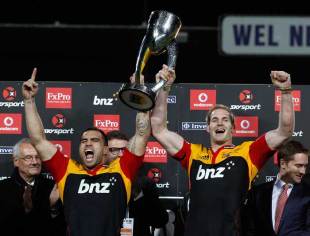|
Super Rugby
SANZAR hails Super Rugby standards
ESPN Staff
August 14, 2012

The Chiefs edged out the Sharks for the 2012 Super Rugby title
© Getty Images
Enlarge
SANZAR game manager Lyndon Bray has talked up the success of the recently-concluded Super Rugby season but admitted certain elements of the game remain a concern. The Chiefs beat the Sharks to claim the Super Rugby title earlier this month to cap a season that SANZAR statistics show produced less penalties and promising 'ball in play' figures. "The statistics indicate a good shape to the game, helping Super Rugby to be a better spectacle for the fans while being fun to play and referee," said Bray. "The penalty count is less, while ball in play time is a strong 17 minutes plus per half, up on a few years ago, when we were lucky to get 14 minutes per half." Initial feedback also suggests an improvement in the number of scrums deemed successful on the first 'hit'. The percentage in 2011 saw only 45% of scrums getting the ball cleared. In 2012, 60% indicates very strong progress towards improving the scrum. But Bray was not entirely happy. "I am really pleased with the efforts of both the referees and the teams, but there is still work to do around the attitude & technique at scrum time," he said. "When you break the stats down at scrum time, we still have an issue in terms of how many scrums collapse (go to ground), and there are also still too many instances of teams breaking the engage call and going early into the hit." SANZAR now intend to use the stats to help engineer further improvement in standards. "The hard work starts now, in preparation for the 2013 competition," said Bray. "We start the review process immediately, while the competition is fresh in the minds of the coaches and the referees. "We put the facts in front of the coaches and referees, in each country, and get them to workshop what the stats are telling us: the good and the bad. The aim is to come away with some really strong messages, for us to work on with both the teams and the referees, as we head into the build up to 2013." © ESPN Sports Media Ltd.
|
Live Sports
Communication error please reload the page.
-
Football
-
Cricket
-
Rugby
-
- Days
- Hrs
- Mins
- Secs
F1 - Abu Dhabi GP
Abu Dhabi Grand Prix December 11-131. Max Verstappen ()
2. Valtteri Bottas (Mercedes)
3. Lewis Hamilton (Mercedes)
4. Alexander Albon ()
5. Lando Norris ()
6. Carlos Sainz Jr ()
-
ESPNOtherLive >>
Darts - Premier League
Golf - Houston Open
Snooker - China Open
Tennis - Miami Open

